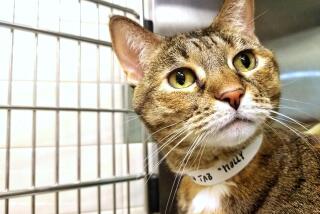Cat’s Endless Licking May Be Hard to Treat
- Share via
Q: What would make a wonderful, neutered male, inside-only Siamese cat suddenly start to groom himself all the time? Nothing in his enviroment has changed, as far as I can figure out. He is loved, petted, spoiled, etc. His appetite is good and his habits haven’t changed. But it drives me crazy to see him sit and lick and lick and lick. He doesn’t have fleas--I go over him with a fine-toothed comb every day. He has no skin disease and looks great.
E.M. Bennett, San Clemente
A: Grooming is a type of behavior that all cats do and for various reasons. Cats generally lick themselves as a method of cleaning their coat of dirt, fleas and loose hair. Licking also can be done as a sign of contentment or affection, as a mother will lick her kittens. However, in your cat’s case, excess grooming may be a form of nervous habit or anxiety in the same manner that people chew their fingernails or scratch their heads. This condition has been described as Psychogenic Alopecia and Dermatitis (PAD).
This condition can be seen in any breed, age and sex of cat, but the majority of cases occur in the Siamese, Burmese, Himalayan and Abyssinian breeds. Since you describe your cat as having no skin disease, he most likely has the alopecic form in which the hair coat is thin, with broken hair shafts and normal-looking skin. The most common pattern of hair loss is a stripe down the back or large patches on each flank. Alopecia (hair loss) also may occur on the back legs, the abdomen, or on the forelimbs. In Siamese cats, the hair coat may return a darker color.
I recommend that your cat be examined by your veterinarian in order to rule out other possible causes of hair loss, such as ringworm fungus. External parasites such as fleas or mites must be considered. Blood tests may be necessary to eliminate the possibility of endocrine (hormone) problems. If there is a skin lesion, a biopsy may be needed to help identify any underlying skin disorders.
PAD occurs when something has changed in the cat’s environment that has upset him enough to start him grooming excessively. A new home or new people, another pet, or a strange cat in the neighborbood are all possible causes. This can be very difficult to determine and requires a good history of when the condition started and other observations on your part.
Treatment consists mainly of eliminating the upsetting cause, if known. Sedatives such as phenobarbital or diazepam are commonly used to reduce the cat’s nervousness or anxiety. Progestational (hormone) drugs such as Ovaban also can be given instead of sedatives. A plastic “Elizabethan” collar may be necessary to help break your cat’s habit of licking. Your cat should be re-examined in two to four weeks after treatment to determine if the medication should be continued lifelong. This syndrome can be very challenging to treat.
Q: I have two male cats at home, a 9-month-old who is neutered and a 5-month-old. The younger cat is starting to urinate and defecate in various places in the house. Both cats are indoors only and have good appetites. Could my younger cat have a urinary problem? There is one litter box in the garage.
J. Amendola
A: Generally, two cats have no problem using the same litter box but, in your case, the younger male may be objecting to sharing the same box. It is less likely that your cat has a urinary problem since he is also defecating in the house and there is no mention of straining to urinate. This younger male also may be starting to exert his dominance or presence by marking the house as his territory. You need to make sure that the litter box is cleaned daily or get a separate box and place the younger cat in it frequently so that he establishes it as his own. You may have to confine him to small areas of the house with his own litter box and attempt to re-housebreak him. If he does strain to urinate or seems to urinate too frequently, have him checked by your veterinarian to make sure there is no bladder infection.
Happy holiday season to all. Help protect your new pets by always keeping your puppy on a leash and collar and your kitten or cat in a proper cat carrier when you travel in your car or take your pet outside to the groomer or the vet.
More to Read
Sign up for Essential California
The most important California stories and recommendations in your inbox every morning.
You may occasionally receive promotional content from the Los Angeles Times.












